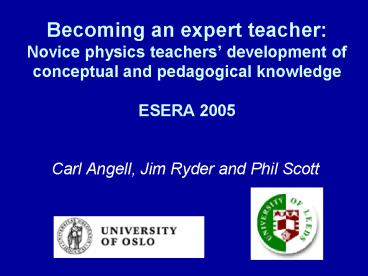Becoming an expert teacher: Novice physics teachers - PowerPoint PPT Presentation
1 / 21
Title:
Becoming an expert teacher: Novice physics teachers
Description:
Becoming an expert teacher: Novice physics teachers development of conceptual and pedagogical knowledge ESERA 2005 Carl Angell, Jim Ryder and Phil Scott – PowerPoint PPT presentation
Number of Views:303
Avg rating:3.0/5.0
Title: Becoming an expert teacher: Novice physics teachers
1
Becoming an expert teacher Novice physics
teachers development of conceptual and
pedagogical knowledgeESERA 2005
- Carl Angell, Jim Ryder and Phil Scott
2
Aim of the study
- To characterise the development of knowledge and
expertise for beginner physics teachers in their
first three years of training and professional
practice
3
Theoretical perspective
- Knowledge base
- Pedagogical action
- Fundamental influences (context, beliefs)
4
Knowledge base
- Subject knowledge
- Curriculum knowledge
- Pupil reasoning
- Teaching strategies
5
Pedagogical Action
- Novice teachers discrete knowledge base focused
on subject knowledge reflected in transmissive,
authoritative practice - Expert teachers integrated knowledge base
reflected in interactive practice that takes
account of student progress
6
Fundamental Influences
- Context Extrinsic influences on teacher action
and development - Beliefs Intrinsic influences on teacher action
and development
7
Knowledge base
Pedagogical action
Fundamental influences
Novice Restricted Transmissive Authoritative
Expert Expanded Interactive Dialogic
Context Extrinsic influences on teacher
performance and development Beliefs Intrinsic
influences on teacher performance
and development
- Subject content knowledge
- Curriculum knowledge
- Pupil reasoning
- Teacher strategies
Novice Discrete elements of knowledge Expert
Links between knowledge within different contexts
8
Methods and Sample
- Written questionnaire was used to probe
respondents thinking about content and
pedagogical issues - 41 beginning teachers
- 16 expert teachers
- Responses were categorised and coded inductively.
Reliability was checked by independent coding of
responses by the researchers.
9
Ball in the air
- You are teaching mechanics to a Year 10 class.
One of the pupils, John, argues that the forces
acting on a ball, when it is thrown up in the
air, are as follows (the diagram shows the ball
after it has been thrown).
10
Ball in the air
11
Ball in the air
- John says
- When you throw the ball up, it sets off with a
BIG upward force but this gradually runs out and
gets less, so that at the top the upward force is
balanced by gravity and the ball stops going up.
The ball then falls because of the pull of
gravity. - a. Do you think that John is correct in what he
says? - b. What would you (the teacher) say in reply to
John?
12
(No Transcript)
13
(No Transcript)
14
Focusing on content knowledge
- Beginning teacher
- You apply a big upward force when you let go.
Once you let go there is only one force acting
downwards on the ball and that is gravity. The
initial throw gives the ball upward movement.
Gravity is opposing the movement, so it slows
down, stop, then speed up as it falls back to
earth
15
Challenging pupils view
- Expert teacher
- I would tell him he was partly correct and
that his explanation of why the ball fell was
right. I would ask him what applies the upward
force after the ball leaves the throwers hand?
Mechanical forces need contact to apply them.
Hopefully he would realise that there could not
be an upward force. I would then use his own
explanation of why the ball fell (i.e. gravity)
in conjunction with Newtons 1st law to explain
why the ball slowed down AND why it left the
throwers hand with an upwards velocity
16
(No Transcript)
17
Experts
- listing questions they would ask in the
classroom - explicitly challenging a pupils view
- addressing pupils everyday thinking
- referring to pupils prior learning experiences
- suggesting possible class activities and/or
discussions - suggesting teaching analogies that would help to
explain the concept - providing a logical pedagogical sequence in their
responses
18
Conclusions
- The comparative analysis with expert teachers
responses has enabled us to identify in some
detail the range of pedagogic understandings that
these novice teachers will need to develop during
their training. Our findings point to the need to
create new ways and opportunities for the
development of pedagogical thinking among novice
teachers. Indeed critical pedagogical reflection
about teaching and learning has to be seen as an
integral part of the teachers professional
development
19
Conclusions
- Our data reflect our conceptual framework
focusing on the shift from novice to expert in
terms of a shift in pedagogical thinking and
practise, i.e. a shift from restricted,
transmissive and authoritative practice to more
expanded, interactive and dialogic practice.
20
Future
- This paper presents initial findings from our
study with a focus on the knowledge base of
expert and novice physics teachers. Future work
will address the development of this knowledge
base as these teachers continue their
professional development in their first teaching
posts.
21
Thank you for your attention
- carl.angell_at_fys.uio.no
- J.Ryder_at_education.leeds.ac.uk
- P.H.Scott_at_education.leeds.ac.uk
- The paper
- http//www.education.leeds.ac.uk/research/uploads
/25.pdf - Working document
- http//www.education.leeds.ac.uk/research/cssme/w
orkingdoc.pdf































